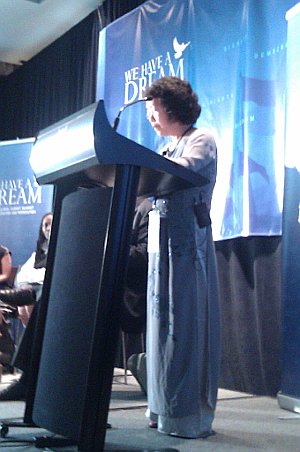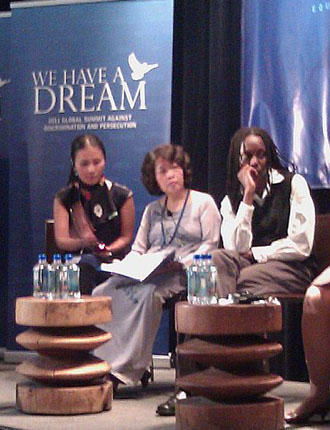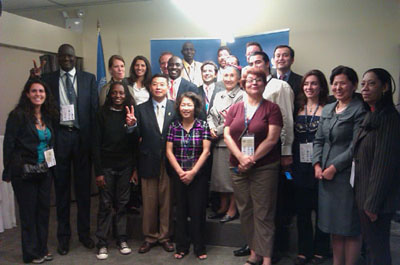On September 21-22, 2011 as world leaders gather at United Nations Headquarters to open the 66th Session of the General Assembly, an international coalition of NGOs (including Viet Tan) hosted a parallel summit to place urgent situations of discrimination and persecution on the international agenda, promote human rights and democracy, and give a voice to the voiceless.
Tran Khai Thanh Thuy joined human rights defenders from around the world to share her experiences and her dream for Vietnam.
Greetings to the organizing committee,
Dear human rights activists attending the summit,
On behalf of the voiceless in Vietnam, and members of Viet Tan everywhere, I’d like to thank the organizing committee for providing me this precious opportunity to speak on the human rights conditions in Vietnam and to share with you about the bitter years I’ve experienced in the Vietnamese communist prison.
To be here today, I’ve gone from the bigger prison of the Socialist Republic of Vietnam and the smaller prisons enclosed by four walls. I’ve been in solitary confinement for ten months where each day a guard would walk by to see if I was still alive. Other times I was jailed with various kinds of common criminals: drug dealers, drug addicts, human traffickers, thieves, organized robbers, rapists, murderers, and so on.
Born in 1960, I was a high school teacher for eleven years. I worked as a journalist for state media for seven years. During the fifty years of living and working in Vietnam, I’ve never committed a shameful act. My dream was shattered and I became a victim of a brutal and corrupt regime because I doted upon the beautiful notions of freedom, democracy, and basic rights and followed my conscience, refusing to write according to the regime’s rule of conduct. I was harassed by the police numerous times in broad daylight, accused of false and ridiculous charges such as drug dealing, attempted murder, using the internet illegally and trafficking in women and children. Dozens of times my house was searched, my personal belongings such as my computer, cell phone, camera, USB drives, books, and manuscripts were confiscated. I was arrested twice, on April 2007 and October 2009, under the charges of “disturbing public order” and “attempted battery” respectively.
Thirty months of unjust imprisonment, both my body and mind were treated extremely cruelly; I’ve gone from life to death then back to life several times. Prison officials cut my diabetes medication for two months, which caused me to constantly experience nausea, cold sweat, pain, shakiness, numbness in the hands, arms, feet, and legs, muttering, urinary incontinence. The eight times in which I was supposed to be brought to an emergency room, I was turned away with no medical care and no medication except for some relaxation pills. As a result, my brain was heavily damaged, causing headaches, dizziness, fatigue, and poor sleeping and eating habits. My body grew weaker day by day. I attempted suicide twice. The first time in B14 prison, I took 34 sleeping pills and went into coma for three days. The second time happened in Hoa Lo prison. The lack of sleep and extreme headaches made me lose control. I tried to drown myself in a basin of water, hoping death can take away all the pain I endured physically and mentally.
I was twice sent to jail and beaten five times. The first time I was beaten by Officer Le Phuong and Investigator Nguyen Hung Tuan. The second time, police sent plainclothes officers to my house to harass me. Two other beatings occurred when I was in jail. Prison guards directed a group of gangsters to beat me in the face, chest, and even private areas. I was hurt both physically and mentally. In the years of writing and advocating for human rights and democracy in Vietnam, regardless being in the big or small prison, I have always lived under threat. Until now, though I’ve been free from both the big and small jail thanks to the help of the US government as well as Viet Tan and other human rights organizations, I still haven’t gotten over this mental crisis. After three months of medication, healthy routines and diet, I still have not recovered physically nor mentally.
Besides being harassed physically and mentally, I was also forbidden to write and was held incommunicado with no access to other political or regular prisoners. All of my writing tools including books, pens, papers, manuscripts and notebooks that were sent to me by my family were all confiscated by prison officials. 
Prison is a place full of unwanted things, risks, tragedies, shames, sorrows, and unfortunate events. From a good person with dignity and author of twenty different books published inside Vietnam and overseas, I was arrested, beaten, harassed, treated like an animal, and became really ill with lack of food and medication. In addition, I was unable to communicate or send letters to my daughter, husband and mother at home. There were times when I experienced depression, delusions, intrusive thoughts and withdrawal from the people around. Without the pressure for my release, I would have probably succumbed to mental illness.
Furthermore, I had to witness many outrageous human rights violations during my two prison terms:
- Prisoners were treated like children, forced to address the correctional officers with terms of filial piety, despite most officers being around forty years younger than the detainees and prisoners. - Prisoners had to wear a badge that included their name, address, crime, date arrested, period of custody to take photos.
- Prisoners were forced to place a conviction stamp on their prison uniforms, as well as on any clothing sent by their family members.
- Prisoners were compelled to provide labor on the weekend to reach a high quota. Everyone had to work nine to ten hours a day with only a 15 minute lunch break. Meanwhile, according to article 15a of Vietnamese law: prisoners are allowed to rest on weekends, if for an urgent reason they are needed to work on the weekend, they must be compensated other rest days. Taking advantage of the fact that most prisoners are illiterate about the law, prison officials intentionally pushed prisoners to work regardless of their conditions. For those that could not provide heavy labor, they had to pay to be excused.
Prison rooms were extremely filthy and unhygienic. A forty-square meter room contained sixty to eighty prisoners, similar to Nazi or Stalinist concentration camps. Everyone had to sleep sideways to make room for each other while enduring the heat, the dreg-filled air, the mosquitoes, and so forth.
All prison rooms were built with two levels. While the upper level was ventilated, the lower level, covered by the upper one, became extremely stuffy and stiflingly hot like a giant human kiln.
On a daily basis, a prisoner was roll-called and body-searched six times. Seventy people hustled each other in daily activities, creating a new prison civilization, one with shared latrine. The pale faces holding their pants and their stomach, waiting until their turn. You will hear gruff voices, bad names, complaints, accusations, and yelling all over the place, as if the world inside the prison was organized with a lack of culture, full of vulgarity and dirt.
 After many hours brutalizing one’s body at the factories and farms, thousands of prisoners crammed against each other at a well, trying to shower. The scene looked like a huge animal farm with the loud noises, jostles, and screams in a space and time that is scanty and limited. If one’s words is the breath of one’s spirit, then the tens of thousands spirits in 900 different prisons across Vietnam are dirty, spoiled, and fetid.
After many hours brutalizing one’s body at the factories and farms, thousands of prisoners crammed against each other at a well, trying to shower. The scene looked like a huge animal farm with the loud noises, jostles, and screams in a space and time that is scanty and limited. If one’s words is the breath of one’s spirit, then the tens of thousands spirits in 900 different prisons across Vietnam are dirty, spoiled, and fetid.
It can be said that never before have human rights in Vietnam been as severely violated as now. Hundreds of people are arrested for peacefully expressing their opinion; petitioning for return of family properties; urging for democratization of the country; calling for change towards a humane society under a pluralist, multi-party system; seeking repeal of Article 4 of the Vietnamese Constitution; demanding territorial integrity; opposing the treasonous, diplomatic note signed by North Vietnam prime minister Pham Van Dong. Whether a petitioner or democracy activist, worker or lawyer, student or intellectual, all fall victim to the Vietnamese government’s crackdown through the so-called people’s public security force (in reality, the police are agents of the Communist Party of Vietnam and act as a channel for suppression of the people’s voice). In order to receive a minimal wage from leaders of the Party, the police willingly put aside their conscience to follow the dictatorship, suppressing and committing serious crimes against their very own people.
There are several hundred examples of human rights violations, illustrating the cruelty of police under the leadership of this dictatorial party.
- At 21:00 on June 7, 2010, Nguyen Phu Trung entered the house of Nguyen Viet Thu (Thuy Xuan Tien village, Cuong My district). Suspecting a thief, Thu grabbed Trung by the collar and beat him then reported to the village’s public security police. At that time, Vu Dinh Nghia (30 years old) was Deputy police at Thuy Xuan Tien village, Le Van Hoan (33) was police officer and Nguyen Quang Sinh (36) utilized electric rods, handcuffs and wooden sticks to beat Trung and broke five of his ribs. After the assault, the three individuals mentioned-above placed Trung on a home-made tricycle and tossed him on the side of the road along the 6A Highway in Tien An, Thuy Xuan Tien village then left the scene.
- On December 22, 2009 the public security police of Bom Bo village (Bu Dang district, Binh Phuoc province) arrested Nguyen Van Long (40 years of age) and escorted him to police headquarters at the village to “investigate alleged acts of child sexual assault.” After an overnight stay at these headquarters, Long died in police custody.
On March 15, 2010, Nguyen Manh Hung, 33 years of age, died in police custody at the headquarters of Ha Dong district (city of Hanoi), his body in the condition of a dry corpse with ten swollen fingertips, purple-black in color; both legs bruised black and blue after 11 days in jail. For the past 18 months, Nguyen Xuan Binh, the suffering father of the victim, has sent applications claiming innocence to numerous places but until now, he has not received a satisfactory answer regarding the painful death of his son.
These examples show that the security apparatus is not an agency to carry out the law or ensure justice but is the instrument of force and repression against ordinary people. The root cause is the arbitrariness and lack of accountability of the system at all levels. Officials give themselves the right to decide everyone else’s livelihood. Unfortunately this phenomenon does not show signs of receding but is only increasing. Those that are supposedly “carrying out official duties” are the ones abusing their powers and making people lose faith in the state.
Not only has the security apparatus grown significantly with some 1.2 million members, the number of general officers has also swelled to 300. In the near future prime minister Nguyen Tan Dung will appoint 70 more generals. Yet Vietnam is inherently unstable.
Another major reason for police abuse is that the Hanoi leadership routinely uses the security apparatus to repress the populace, such repression often carried out by so-called regular people. As a result the number of people injured or beaten to death by police is innumerable. This includes the democracy activists, labor organizers, farmer activists who’ve been arrested and tortured in prison. Some of the activists detained recently include Ho Thi Bich Khuong, arrested for the third time on January 1, 2011. Nguyen Hoang Quoc Hung, Do Thi Minh Hanh and Doan Huy Chuong detained in February 2010. And Pastor Duong Kim Khai, Tran Thi Thuy, Nguyen Thanh Tam, Pham Van Thong, Nguyen Chi Thanh, Pham Ngoc Hoa, and Cao Van Tinh arrested in July 2010.
The Hanoi regime is cavalier to public criticisms of its human rights record. It continues to restrict internet freedom, private media and independent organizations. It cracks down on those advocating for free speech, genuine legal reform and release of political prisoners.  Attorney Cu Huy Ha Vu was detained in November 2010. Professor Pham Minh Hoang was arrested August 13, 2010. Blogger Nguyen Van Hai was detained a second time in October 2010 without a clear reason. Since July and August, over 13 young Catholic activists and bloggers have been arrested arbitrarily.
Attorney Cu Huy Ha Vu was detained in November 2010. Professor Pham Minh Hoang was arrested August 13, 2010. Blogger Nguyen Van Hai was detained a second time in October 2010 without a clear reason. Since July and August, over 13 young Catholic activists and bloggers have been arrested arbitrarily.
The UN Special Rapporteur on human rights is regularly denied access to Vietnam. The oft used line by communist Vietnam is that they do not arrest political dissidents, only law breakers. This shows that the regime is dishonest on human rights and trying to mislead public opinion. Vietnamese at home and abroad will have to work together to achieve their own human rights. At the same time, the support of freedom-loving people everywhere is extremely important. We appreciate past international support and with the increasingly urgent situation, call on the world community to support the democratic process in Vietnam and pressure the Hanoi communist regime to respect basic freedoms as guaranteed in the Universal Declaration of Human Rights.
In closing, my dream is that in the soonest time possible the communist regime will bow its head to the Vietnamese people at home and abroad and to the international community as well for its human rights abuses all these years.
Tran Khai Thanh Thuy
New York City
September 22, 2011
Source: NGO Summit





